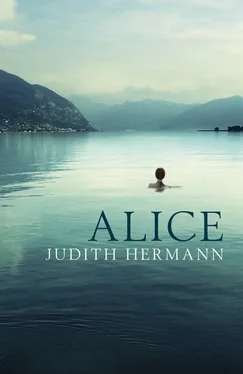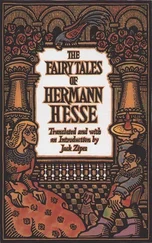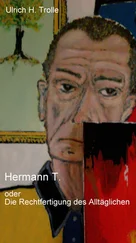Judith Hermann - Alice
Здесь есть возможность читать онлайн «Judith Hermann - Alice» весь текст электронной книги совершенно бесплатно (целиком полную версию без сокращений). В некоторых случаях можно слушать аудио, скачать через торрент в формате fb2 и присутствует краткое содержание. Год выпуска: 2011, Издательство: Clerkenwell, Жанр: Современная проза, на английском языке. Описание произведения, (предисловие) а так же отзывы посетителей доступны на портале библиотеки ЛибКат.
- Название:Alice
- Автор:
- Издательство:Clerkenwell
- Жанр:
- Год:2011
- ISBN:нет данных
- Рейтинг книги:3 / 5. Голосов: 1
-
Избранное:Добавить в избранное
- Отзывы:
-
Ваша оценка:
- 60
- 1
- 2
- 3
- 4
- 5
Alice: краткое содержание, описание и аннотация
Предлагаем к чтению аннотацию, описание, краткое содержание или предисловие (зависит от того, что написал сам автор книги «Alice»). Если вы не нашли необходимую информацию о книге — напишите в комментариях, мы постараемся отыскать её.
Alice — читать онлайн бесплатно полную книгу (весь текст) целиком
Ниже представлен текст книги, разбитый по страницам. Система сохранения места последней прочитанной страницы, позволяет с удобством читать онлайн бесплатно книгу «Alice», без необходимости каждый раз заново искать на чём Вы остановились. Поставьте закладку, и сможете в любой момент перейти на страницу, на которой закончили чтение.
Интервал:
Закладка:
Alice put the bag into the pocket of her own jacket. She just couldn’t throw it away. There seemed to be a structure to these actions, time that had to pass. First find it, then comprehend it, then throw it away. Achieve a certain distance. Take your time — it annoyed her when Raymond used to say that. Take your time. Back upstairs. She put the winter jacket into the box for the Red Cross. The glove too. A glove for the right hand. She didn’t slip her hand into it again.
And his shirts. His trousers. Underwear, T-shirts, hats, and shoes. A red and white checked shirt — no memories. A blue shirt brought a flood of memories, but she was able to push them away; she was able keep at bay the memory of Raymond opening the door for her one day in July, the middle of summer, one of innumerable record-breakingly hot summers — Raymond, very busy, had gone back into the apartment right away but was happy she had come. His face, the way his face looked when he was delighted to see her. She’d had a glass of tea, sitting by the window, leafing through a newspaper. Will you read to me? Nothing important. Raymond was wearing that blue shirt, little holes in it, carefully mended with many stitches, a round, old-fashioned neckline, as if from another time. So this was the shirt, then. And grey, green, or black trousers. Holes at the knees. Paint stains, torn pockets, decent trousers. Precisely folded T-shirts. With or without pictures printed on them. A silly bear. Camouflage patterns. Colourful prints. And Raymond’s shoes. His orthotics. No glasses. Swimming trunks. Don’t hesitate, Alice thought, trembling, Stop hesitating so idiotically long; and she put everything away, put all of it together and into the Red Cross box; the blue jacket and a green T-shirt were still in the box intended for the attic.
She carried the Red Cross box down the stairs. The box, the first of many, was pretty heavy. She had taped it shut with adhesive tape; no one would ever be able to get the tape off. Downstairs, the Indian cook came out into the hallway. An incredibly dirty apron. Chicken curry. Behind him, Alice could see the second Indian cook, against the red tiles, in the steam of the dishwasher. Nice pictures. Moving? The cook already looked shocked.
No, not moving. Throwing out, sorting, giving away, back into the stream.
Oh yes, the Ganges. The cook gave a loud laugh. Alice had to laugh too. He took the box from her and carried it the entire block to her car. He was wearing flip-flops, and he had brought the chicken curry smell with him from the kitchen. Also the smell of fresh-sliced pineapple, basil, tomatoes, and vinegar cleanser. That smell clung to the box and the car and Alice’s hands until she dropped the box into the maw of a Red Cross container.
That first summer without Raymond she stalwartly went to the swimming pool. Almost every morning of every day she had off. And because she didn’t want to drive out to the lake by herself — was unable to drive there by herself with the picnic blanket for her alone, the rustling of the newspaper pages, and the impenetrable thicket of the forest, it was hopeless. So, off to the swimming pool, maybe a more civilised thing to do. A short stretch on her bike on the shady side of the street, almost 20 degrees at nine o’clock in the morning. To the same swimming pool near the park that Raymond went to as a child — Alice had a photograph of Raymond on the steps in front of the changing cabins, six years old, squatting on the wet stone, one leg drawn to his chest, the other stretched out. He was squinting at the camera, against the light, and his black and white child’s face was distorted because he was dazzled by the sun; yet Alice always thought that it looked as if he were crying. Raymond claimed he wasn’t crying, that he had been jumping off the ten-metre diving board for an hour, constantly, without interruption; he had done that and then he’d gone home.
The stairs in front of the changing cabins were now blocked off. The paint on the broad steps was peeling, turquoise flakes; grass grew in the cracks between the stones. The spot where Raymond had been sitting back then was unrecognisable. But the diving board was in use today as it had been then, and swimmers were diving off the springy ten-metre board non-stop, a falling figure every three minutes. Alice spread out her towel near the large pool, next to a low wall behind which broom was growing and rubbish was piling up. Coffee cups, broken water wings, cigarette butts. She swam for half an hour, conscientious, neat lengths, her head held high above the water; then she walked back to her towel, stretched out on her back, closed her eyes. Planes. Sparrows in the broom, excited chirping. The ecstatic screaming of children and the quick steps of their little wet feet. Mothers spread out bath towels next to Alice, a dark shadow on her closed eyelids, as though a large bird were crossing the sky; then again the steady brightness, children, their teeth chattering, shaking the water from their hair, a shower of drops on Alice’s stomach, like a human touch, something intimate.
Would you move over a little, please?
Alice, who was by herself with her small towel, her newspaper, and yellow bottle of suntan lotion, ranked lowest here; she accepted that and always smiled, grateful just to have someone speak to her. She rolled up her towel, moved aside, making room for more mothers with pushchairs, toting melons like cannon balls, pop bottles, Thermoses, mountains of folding chairs and plastic bowls full of pasta salad. Ensconced in this dreamlike atmosphere, she fell asleep. Shrill voices, laugher, children crying, the smell of peaches, tropical oils and wet stone, chlorine and the fine, dry smoke of cigarettes. And falling asleep she forgot that Raymond had died, forgot that he no longer existed, simply stopped thinking exhausting, wordless, terrible thoughts about him. She let go. Drifted away into the noonday heat, for one whole precious hour. Last night I dreamed that my teeth were falling out, a woman next to Alice was saying. It’s supposed to have something to do with repressed sexuality. Oh, I don’t believe it, said another, adding, as though that had settled it, It’s a beautiful day.
I have to tell Raymond about that, Alice thought, sleepy and amused. I have to imitate the tone of her voice, the self-assured disparagement, followed by the casual remark about the weather. Then she remembered that this was no longer possible, and she came back to reality, wide awake, sat up as though someone had called her. She rubbed suntan lotion on her shoulders, legs, feet, and sat there a little while longer, holding the insides of her arms up to the sun. It had been a long time since she’d last sunned herself like this. The last time, probably a hundred years ago, when she’d been at Lago di Garda with Anna, really long ago. It was an aching, longing memory, a loving one — a state of being — nothing about this love would ever change. Anna’s hair, dulled by the sun, her eyes, shiny black, rough hands like a child’s. Lying next to each other, sunning themselves, just talking, looking out over the water, hands cupped over their eyes, rummaging among the water-worn pebbles, picking out a few but then leaving them behind. In the evening, checking out their tans in the mirror, the white breasts above the brown stomachs. She certainly hadn’t done that with Raymond.
At midday Alice packed up her things, put her dress on over her bathing suit, and said goodbye to the mothers. They didn’t reply, probably just out of laziness. Then she left. Passing the pool with the fountains where boys were dunking girls in the water, again and again pushing them down, then at the very last moment pulling them up by their hair, and the girls flew out of the water and screamed, triumphant and shrill. What kind of ritual was that? Alice was sure she and Raymond had also performed this ritual, long ago, both alone and with others, but she couldn’t remember exactly. By the time she met Raymond, almost all the rituals had already been performed, almost all, except for just a few. Who would have thought? She dipped her feet into the lukewarm water of the shallow pool just before she came to the dried-up lawn, then put on her sandals.
Читать дальшеИнтервал:
Закладка:
Похожие книги на «Alice»
Представляем Вашему вниманию похожие книги на «Alice» списком для выбора. Мы отобрали схожую по названию и смыслу литературу в надежде предоставить читателям больше вариантов отыскать новые, интересные, ещё непрочитанные произведения.
Обсуждение, отзывы о книге «Alice» и просто собственные мнения читателей. Оставьте ваши комментарии, напишите, что Вы думаете о произведении, его смысле или главных героях. Укажите что конкретно понравилось, а что нет, и почему Вы так считаете.












